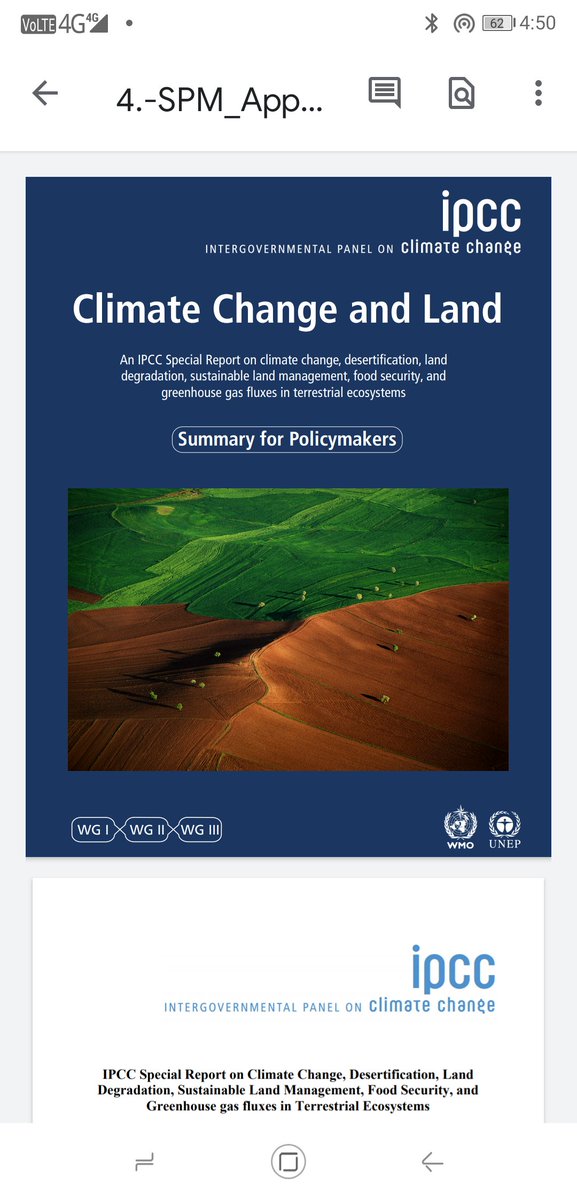I& #39;m thinking about energy in a walking pace culture.
Energy is the core, and should be the focus, of the ecosystem catastrophe.
Calling it climate change is like calling what Russia did to us meddling.
It is an ecosystem collapse.
Energy is the core, and should be the focus, of the ecosystem catastrophe.
Calling it climate change is like calling what Russia did to us meddling.
It is an ecosystem collapse.
That& #39;s a screenshot. Here& #39;s a link, to a copy of the UN paper which I keep handy. https://drive.google.com/file/d/1-8ucqYCpc7oIDND3n4icRCbCGw2kUK-s/view?usp=drivesdk">https://drive.google.com/file/d/1-...
3. Read this. Be aware of the places where they state facts and the places where they draw conclusions.
Almost everything I write, my whole slow-down / perennial-agriculture thing, grew up in my little repairman& #39;s mind after I read this document carefully several times.
Almost everything I write, my whole slow-down / perennial-agriculture thing, grew up in my little repairman& #39;s mind after I read this document carefully several times.
4. My thesis can be said as follows: we must operate all of human society worldwide on naturally available ecosystem based energy, while driving, through our actions, a global increase in ecosystem permanence, diversity, and overall increase of all forms of life which feeds us.
5. So, a friend asked me today, what do I think about bicycles. I& #39;ve got no problem with bicycles. They run on current energy. Food energy. What& #39;s not to like?
Bicycles aren& #39;t for me. My donkeys can carry 500 pounds of feed home from town. But I& #39;m me, and nobody else has to be.
Bicycles aren& #39;t for me. My donkeys can carry 500 pounds of feed home from town. But I& #39;m me, and nobody else has to be.
6. This person addressed the current ecosystem footprint of manufacturing bicycles. That& #39;s kind of my whole point about a globe-spanning new power infrastructure - you can& #39;t even make a bicycle without highly concentrated energy. Carbon energy.
7. So, while we& #39;re living on natural current energy like fairies in a swords and sorcerers novel, who makes the steel?
But see, we& #39;re not in a fiction book. We& #39;re shooting for, for the first time in five thousand years, living up to the Sapiens part.
But see, we& #39;re not in a fiction book. We& #39;re shooting for, for the first time in five thousand years, living up to the Sapiens part.
8. When we make a bicycle, we take a bunch of concentrated energy, and we use it to make, shape, and weld, some metal. Steel is a biggie. Aluminum. This energy has two characteristics, strength - degree of concentration of energy into a small point of impact - and quantity.
9. Humans figured out how to make iron stuff a looooooooong time ago. Iron is one of the main components of Earth& #39;s mantle. It& #39;s all around us. In us. Iron is a good resource. Steel is iron, carbon, and concentrated energy. This ain& #39;t hard.
10. Steel is possibly the most nearly totally recyclable material on the planet save carbon itself, which is endlessly recycling into living things.
Using current technology you can& #39;t even make new steel unless you& #39;ve got some old steel to toss in. Critical ingredient.
Using current technology you can& #39;t even make new steel unless you& #39;ve got some old steel to toss in. Critical ingredient.
11. So. Bicycles. Steel ones are heavy. Whatever. Energy. Our current system is based on an endless cycle of buying and selling. If the buying and selling stops the system blows up. Think, George W. Bush, 2007.
If we lived in an enough, walking - or bicycling - pace,
If we lived in an enough, walking - or bicycling - pace,
12. economy, the whole world would only need a tiny handful of new bicycles a year. A well made bicycle should easily last a hundred years. I& #39;ve got a Ford tractor that& #39;s over 70 years old, that I regularly use. Works like it did when it was new. No better, not much worse.
13. If we had a nickel& #39;s worth of sense, government would encourage people to carbonize waste wood and similar organic materials. That process gives off energy. Instead of setting a brush pile on fire, pay the farmer to make biochar out of it. Or make it a market item.
14. While you& #39;re at that, you can grind up the charcoal and fertilize the Earth with it. It& #39;ll stay down there for at least hundreds of years. That& #39;s called carbon sequestration. You may have heard of it.
But say you only grind up 75% of it, and the other 25% goes to make bikes.
But say you only grind up 75% of it, and the other 25% goes to make bikes.
15. OK, that& #39;s circular carbon. Air to tree to air. If you don& #39;t get stupid with it, at modest volumes you can do that forever.
The quantity becomes the limiting factor.
We have to make enough and no more.
There& #39;s enough energy to make enough. We& #39;ve just got to get back on Earth.
The quantity becomes the limiting factor.
We have to make enough and no more.
There& #39;s enough energy to make enough. We& #39;ve just got to get back on Earth.
16. Suppertime. Later.

 Read on Twitter
Read on Twitter


